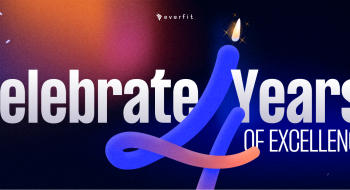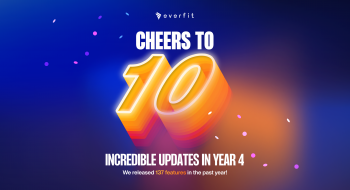In the rapidly evolving fitness landscape, staying ahead is crucial. Occasionally, transformative technological waves sweep through various industries, and fitness is no different. The advent of artificial intelligence (AI) stands out as a game-changer, and Everfit‘s recent webinar, “Future of Fitness: Unlock AI’s Power in Fitness Coaching,” explores how AI is reshaping the sector. The sudden emergence of AI has the potential to reshape the fitness business model, ushering in fresh avenues for innovation in fitness coaching.
At this monumental event, Everfit brought together an illustrious panel of industry titans to share their profound insights. These thought leaders are not just experts; they are visionaries and trailblazers shaping the future of fitness. Among them, we had the privilege of hosting:
Mohammed Iqbal, Founder and CEO of SweatWorks
A true luminary, Mohammed Iqbal is on a mission to enrich lives through knowledge, empowering individuals to make healthier choices. He is the brilliant mind behind SweatWorks, a digital agency that has evolved from a single fitness app company to a global powerhouse. As the Founder and CEO of SweatWorks, Mohammed drives innovation and embodies the agency’s core values of health and activity. His influence extends across the globe, as he has been a distinguished speaker at prestigious events like CES, Running USA, Mass Participation Asia, and Fit Tech Summit. The SweatWorks client roster boasts giants in the athletic event and fitness industry, including Nike, Virgin Sport, Bose, and Equinox. With groundbreaking technologies, Mohammed and SweatWorks are revolutionizing fitness accessibility, earning the company a coveted spot on the Inc 5000 list of fastest-growing private companies for four consecutive years.
Sean Greeley, Founder & CEO of NPE
Sean Greeley is a multifaceted force in the fitness industry—an entrepreneur, coach, family man, author, and speaker. As the Founder and CEO of NPE, Sean’s life’s work revolves around helping fitness entrepreneurs build sustainable and predictable 7-figure businesses. His unwavering commitment is to provide fitness entrepreneurs with the clarity, confidence, and courage needed to break through and scale their businesses without sacrificing their personal lives. NPE, under Sean’s leadership, offers the #1 suite of business growth systems, tools, and coaching for fitness entrepreneurs worldwide. With a track record of helping over 53,000+ fitness businesses in 96+ countries reach new heights, NPE has earned a spot on the Inc 500/5000 list of fastest-growing companies a remarkable eight times.
Read on to get actionable insights as we delve into the transformative potential of AI in fitness coaching.
1. AI: Friend Or Foe For The Fitness Coaches?
The webinar kicked off with a thought-provoking debate on whether AI is a friend or foe to fitness coaches. Founder and CEO of Sweatworks Mohammed Iqbal suggested the technology could be a double-edged sword. On the positive side, it could be a keystone technology that helps coaches at larger gyms and enables more success. Intelligent assistance could streamline client information gathering, allowing coaches to base their programs on clients’ lifestyle data.
On the downside, the industry could view AI as “the enemy” by putting some jobs at risk. “If you don’t incorporate AI, you risk becoming obsolete,” Mohammed said, reflecting a common internet meme: “AI probably won’t steal your job, but people using AI will.”
Whether we should view AI as a friend or foe was also a matter of contention. Calling AI either good or bad was misleading, according to VP of Platforms and Growth at Everfit, Matty Perk. “AI is a tool, not a person, and something fitness coaches avoid at their peril.” Everfit Co-founder & CEO Jon Wang agreed with this idea. “It’s a technology to explore, embrace, and not be afraid of.”
As such, AI isn’t a friend or a foe, and it probably won’t replace humans outright. Instead, the panelists viewed it as a tool of varying importance. Some believe it is game-changing, while others see the human element still dominating.
2. AI Trends In The Fitness Industry
The discussion of AI trends in the fitness industry continued the theme that artificial intelligence would be a tool, not a replacement for people.
Personalization with time-saving:
Speakers highlighted new personalization capabilities and productivity improvements the technology could bring. Coaches could leverage AI to tailor the fitness journey for their clients due to the abundance of available data. Coaches with low client volumes could process their clients’ information faster, allowing them to get more done without extending the working day. However, as client lists grow, it becomes increasingly time-consuming, extending the working day and getting in the way of face-to-face interactions. AI could rectify this by reducing processing time so small gyms and coaches could take more clients.
Marketing tools:
Speakers also noted that AI tools are now helping coaches acquire clients. “A lot of coaches are great coaches, but not marketers and not natural at developing messaging and campaigns,” Sean said. “We had AI today for ad creation and funnel creation for clients. You can hit a button and get suggestions for messaging to use.” However, participants also cautioned against taking AI suggestions at face value. “One of the big things that happened when ChatGPT came out was hallucination,” Long said. AI models would essentially say things that sounded true with confidence but were false.
The takeaway is that fitness coaches should use AI with caution. New technologies offer some productivity and scalability benefits but still make errors requiring human correction.
3. What Are The Use Cases Of AI In Fitness Coaching?
Even though AI has its limitations, it’s still a valuable tool for coaches today.
AI will have a profound effect on coaches’ ability to collect and use data. For example, AI may let fitness professionals personalize services to clients. Coaches could leverage AI to tailor the fitness journey using available data. Professionals with low client volumes could use AI to process their clients’ information faster, allowing them to provide a more bespoke service in line with the larger providers.
Matty Perkins, VP of Platforms and Growth at Everfit, shares the belief that AI can significantly enhance productivity, emphasizing that “AI is a tool, not a person, and something fitness coaches avoid at their peril.” He highlights how artificial intelligence has the potential to save coaches valuable time. While it doesn’t replace human coaches, it can efficiently handle multiple small tasks daily, effectively reclaiming 4 to 5 hours each week. This time-saving aspect is especially valuable as it allows coaches to avoid sacrificing their weekends, enabling them to spend more quality time with their families.
In line with this, Sean suggests leveraging AI to automate repetitive tasks such as scheduling, client progress analysis, workout monitoring, and nutritional pattern analysis. This strategic use of automation liberates coaches’ precious time, enabling them to concentrate on the more personalized dimensions of training and client interactions. As Sean aptly puts it, “If you want to grow, you better be working on things that are more valuable in terms of output and not getting stuck in menial tasks that suck your time and energy.”
AI tools could also help coaches acquire clients without having to invest so much time. “A lot of coaches are great coaches, but not marketers, and not natural at developing messaging and campaigns,” NPE’s Founder and CEO Sean Greeley says. “But now we have AI today for ad creation and funnel creation for clients. You can hit a button and get suggestions for messaging to use,” streamlining the process. The panel concluded that AI had tremendous potential. Long called it a “north star” – something the industry was pinning its hopes on to free up time and provide a superior service to clients.
4. What Challenges Do Fitness Coaches Face Incorporating AI into their business models?
However, despite these use cases, there remain challenges that fitness coaches face when incorporating AI into their practices.
Learning Curve
The biggest challenge with these new technologies is learning how to use them effectively. To reap the rewards, fitness coaches need to invest time in understanding the available products. Following Matty’ advice, he recommends starting with just 15 minutes each day to familiarize yourself with AI tools and how they work. As you gradually incorporate AI into your daily routines, you can adjust the time you spend accordingly. Consistent practice will make you skilled in using AI for different aspects of your training and managing your business. Once you’ve got the hang of it, these artificial intelligence tools can help you address your weaknesses and turn them into strengths.
However, the industry needs to do more to onboard instructors. Mohammed suggested coaches ask software providers what AI-enabled tools they have in the works and how they can help drive productivity and efficiency. That’s because platform subscription fees are not the primary investment when using these tools. Instead, it is the time coaches spend onboarding themselves and their clients and learning to leverage these technologies.
Credibility
As before, credibility is a significant issue. Mohammed said coaches shouldn’t trust everything AI generates. Instead, they use the response as a tool and use their intelligence to formulate a plan. After all, AI can only generate answers based on inputs.
Matty built on this point by suggesting that AI is great for outsourcing tasks rather than decision-making. He argued humans should still be in the loop in fitness coaching because that’s the core value proposition.
Practical Implementation Challenges
Sean finished by highlighting the practical challenges of implementing AI in fitness coaching. He said knowing where to start with AI was a core issue and that fitness instructors needed direction. Coaches must assess their businesses, look at their strengths, and see where the AI leverage lies. Instructors who aren’t sure how to proceed should ask for help and get assistance using these tools as the technology develops. Wasting time is the opposite of what AI in fitness is supposed to achieve.
In other words, fitness coaches should use AI cautiously. Some tools will be helpful, but whether they can provide common-sense solutions to everyday problems remains to be seen. “The main challenge is knowing what to use and how much time to invest,” Jon said.
5. Wrapping up
As the debate about AI’s role persists, it becomes evident that AI is a powerful tool rather than a substitute for human expertise. Coaches can strategically incorporate AI to enhance their services while maintaining the essential human element. AI acts as a guiding “north star” in this transformative journey, providing not only time-saving benefits but also the potential for superior service delivery. To gain a more comprehensive understanding, we encourage you to explore the full webinar and engage with our panelists for further discussions or any questions you may have.















